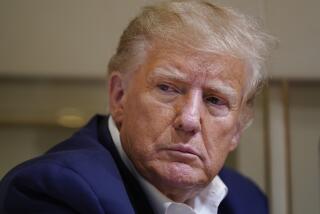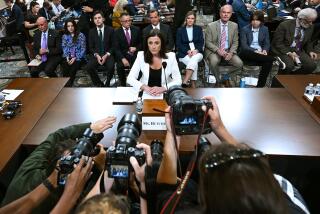North Tells of Bush-Iran Parley Plan : Contras: The former Marine colonel testifies at the Poindexter trial that he does not know if the then-vice president was aware of the discussion.
- Share via
WASHINGTON — Oliver L. North testified Tuesday that his hapless and hazardous flight into Tehran at the height of the Iran-Contra affair was originally conceived as an advance trip to prepare the way for “a senior Administration official--perhaps even the vice president--to meet with the leaders of Tehran.”
The testimony in the trial of retired Rear Adm. John M. Poindexter in U.S. District Court was the first mention that anyone considered such a role for then-Vice President George Bush.
But, when asked if Bush, as vice president, had been aware of North’s activities, the former Marine lieutenant colonel replied: “Counsel, I don’t know which of the documents that I sent to Mr. Poindexter and Mr. McFarlane were sent to the vice president’s office.” Robert C. McFarlane was Poindexter’s predecessor as national security adviser.
North did acknowledge, as has been reported often, that Bush sent him a congratulatory note on Thanksgiving Day in 1985 that praised North’s work as “one of the many things I have to be thankful for.”
Poindexter, who resigned as President Ronald Reagan’s national security adviser in 1986, is charged with five counts involving a conspiracy to destroy documents, obstruct investigations and lie to Congress in the worst scandal of the Reagan Administration.
Adding a touch of derring-do to his testimony about the May, 1986, Tehran trip, North also revealed that he had carried “a covert listening device” to “tape-record all of the meetings that I had with the Iranians and other intermediaries.” North made the trip with McFarlane, who at the time was no longer a government official.
The testimony about the Tehran flight was drawn out by Richard W. Beckler, Poindexter’s defense attorney, who spent most of the day trying to coax the former national security officer into disassociating Poindexter from responsibility for most of the shadowy intrigue during those days in the White House. It was North’s third day on the stand.
But, although he agreed that Poindexter did not work hand-in-hand with him or telephone him every day, North insisted: “I did keep the admiral apprised of what I was doing.”
North, who was convicted last year of destroying documents and obstructing Congress, organized a complex operation in which the profits from the sale of arms to Iran were used to arm the Contras fighting in Nicaragua.
Recalling the Tehran flight served Beckler’s purpose because North, in the early stages of planning, had circumvented Poindexter by enlisting the support of McFarlane. Beckler’s questioning has made it clear that he is trying to put much of the responsibility for the events on McFarlane, who pleaded guilty in 1988 to withholding information from Congress.
North testified that he had proposed a flight to Tehran with an advance party to prepare the way for high-level negotiations with the Iranians that could lead to freedom for the American hostages held by Iran-influenced Islamic fundamentalists in Lebanon.
But “the admiral was very opposed to an advance trip,” North testified. “He believed the risk was too great. I believed the risk was worth it.”
Without informing Poindexter, North testified, he sent a message to McFarlane in February, 1986, asking him “to importune with the admiral to make the trip.” Although McFarlane was no longer a government official, he still kept a National Security Council computer terminal at home, and North could communicate with him through its secret channels.
Explaining this odd arrangement, North told Judge Harold H. Greene: “Mr. McFarlane had started the (Iran) initiative; he had been involved in it from the beginning, and it is my understanding that he stayed involved in it.”
The White House decided to allow the trip by North and McFarlane, who would try to negotiate the release of hostages. By the time the trip was approved it was no longer being considered as preparation for a visit by higher-level officials.
Although no high Administration official was aboard the plane, McFarlane was authorized to negotiate on behalf of the U.S. government. The May, 1986, trip, however, was a disaster. McFarlane failed to obtain the release of any hostages, and the flight itself inspired rumors that spread throughout the Middle East and eventually led to public disclosures about the Iran-Contra affair.
Although North, in his testimony, noted that the original planners thought of the possibility of using the vice president in the negotiations, he did not elaborate and was not questioned further about it. President Bush has continually denied any involvement in the Iran-Contra affair.
Beckler was so circuitous in his attempts to induce North to relieve Poindexter of responsibility in the scandal that his questioning seemed to trouble Greene and lose the attention of the jury.
At first, Greene showed his patience. “I have a lifetime appointment,” he said, “and, if necessary, I can listen to Col. North until my term runs out.”
Later, he snapped: “If it wasn’t this kind of case with this much visibility, I would have struck half of your questions.” He then warned Beckler that his patience could not hold indefinitely. True to his threat, he then cut the lawyer’s questions off several times, pronouncing them irrelevant.
More to Read
Sign up for Essential California
The most important California stories and recommendations in your inbox every morning.
You may occasionally receive promotional content from the Los Angeles Times.













